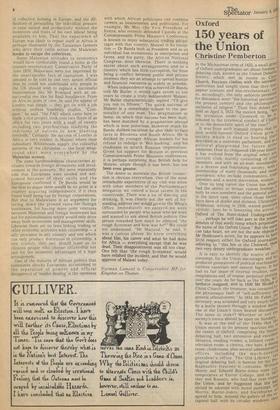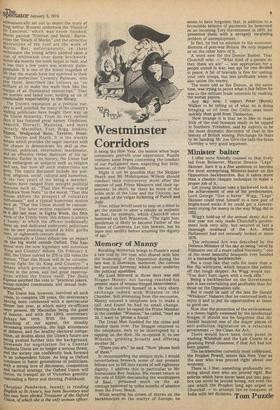Oxford
150 years of the Union
Christine Pemberton
In the Michaelmas term of 1822, a small grouP of Oxford undergraduates set about forming a debating club, known as the United Debating Society, which met in rooms to Ch Church. Church. Previous clashes with the univers141 authorities had taught them that they Illusd appear tolerant and non-revolutionary, arlA so, accordingly, the only subjects permitto for discussion were "the historical.previous, rel the present century and the philosophlca, exclusive of religion." Their first debate Wa: held on April 5, 1823, the motion being, the revolution under Cromwell to be 8`‘ tributed to the tyrannical conduct of Charles or to the .clemocratic spirit of the time?" ,e It was from such tranquil origins that tua now world-famous Oxford Union grev%If society which is used to hearing its`, described as a miniature parliament, and as; political playground for future PrIril ministers. Over its chequered 150-year historY
i :
t has evolved from the original select allsd tocratic club, mainly consisting of title,, members, and with an all-male membershlv1. to a diverse and flourishing society, with t membership of many thousands, and recerl presidents who include communists, trarl' unionists and, a major innovation, women. s Over its long career the Union has alvign had the ability to arouse violent feelingaj„ both its own members and the general p1.1!) i 11': n the latter case, quite often those feeling; have, been of dislike and derision. ChristoPhew Hobhouse, writing in 1939, waxed positiv°! vitriolic: here he is lamenting the arrival 11; Oxford of The State-Aided Undergraduate; c, . .. perhaps he will take part in the jejeua: debates of that seedy rump which perpetua,te' the name of the Oxford Union." But the ural can take heart, we are not the sole object Mr Fjobhouse's scorn, for he appears to hal little respect either for Oxford journal's referring to "this Isis or the Cherwell, the'" two very dreary undergraduate weeklies.' h It is easy to identify the source of soc5 contempt, for the Union encourages and 113, produced generations of political machinator ruthless careerists and earnest bigots. It Llas had its fair share of internal troubles, roe resignations and, of course, perpetual plottl over the years. As far back as the 1820s. Of berforce resigned, and in 1830 Mr Modell 4)1 Christ Church, the treasurer, was censured f0ii the picturesque fault of "self-sufficiency anhe general offensiveness." In 1834 Mr Faber,.tPd secretary, was wounded and very nearly lolLeg by a bottle thrown through a window chlrl„"s one of the Union's more heated discusslo",e' The issue at stake? Whether or not t" society's rooms should be open on Sundays.e It was at the end of the 1840s that tlio Union moved to its present spacious site ois the centre of Oxford, comprising the fain° t debating hall, two extensive and excellel/n libraries, reading rooms, a billiard room: television room, a cinema, two bars, a chnl,ve room, cloakrooms, plus several administrativd offices, including the much-covete,,e Rresident's office. The Old Library, original debating hall, is famous for the r. Raphaelite frescoes it contains. Morris and Edward Burne-Jones were 057 temporaries at Exeter College, and in, I.8ted they met Rossetti, who had that year visi the Union, and he suggested that the 118'd should be adorned with mural paintings, ano Morris, Burne-Jones, and Swinburne c. agreed to help. Around the gallery of the °ev tagonal hall, with its circular windovvs, th ' enthusiastically set out to depict the story of King Arthur. Rossetti undertook the 'Vision of Sir Lancelot,' which was never finished; Morris painted 'Tristram and Iseult,' BurneJones the 'Death of Merlin;' and the attractive decorations of the roof are the work of Morris. But, unfortunately, in their enthusiasm the young artists painted upon a Coat of whitewash over damp brickwork; within six months the work began to fade, and in less than a few years was scarcely distinguishable. It is one of the minor tragedies of life that the murals have not survived in their original perfection: Coventry Patmore, who saw them, described the colours as "so brilliant as to make the walls look like the Margin of an illuminated manuscript." They , are sombre and faded now, lending an air of comfortable respectability to the library.
The Union's reputation as a political nursery is well justified, for many of the country's leading politicians have fought their way up the Union hierarchy. From its very earliest days it has fostered great names: Gladstone, Asquith, Disraeli, Manning, and more recently, Macmillan, Foot, Hogg, Jenkins, R.Innon, Wedgwood Senn, Taverne, Hesel-, tine, Thorpe and Heath. It is the weekly debate which provides the eager aspirant with the chance to demonstrate his skill as rhetorician, politician, entertainer, machinator, and an effective verbal destroyer of his opPonents. Earlier in its history, the Union had tacit embargoes on subjects such as religion and sex, but now all such restrictions are gone. The topics discussed include the political, religious, social, cultural and humorous. In the two years of my being a member, debates have ranged from straight political Motions such as "That this House would Withdraw from Nato," to the moral, "That this House abhors the prospect of voluntary euthanasia," and a typical humorous motion such as, "That this Union should be consummated." The latter motion regularly appears, as it did last year, in Eights Week, the fifth Week of the Trinity term: this debate is always a 'funny,' at which the officers traditionally dress up, and dedicated embryonic politicians Can be seen prancing around in kilts, gorilla suits, or eighteenth-century dress.
Occasionally a Union debate has an impact on the big world outside Oxford. This happened with the now legendary and notorious King and Country' debate. On February 4, 1933, the Union carried by 275 to 152 votes the Motion, "That this House will in no circumstances fight for its King and Country," a debate which provoked an unprecedented furore in the press, and had great repercusons within the Union itself. The Daily zxpress ascribed the vote to "practical jokers, woozy-minded communists and sexual indeterminates." The Union has, however, survived all such crises, to complete 150 years, the anniversary having been celebrated with a spectacular dinner last year, at which many ex-officers Were present, Mr Macmillan being the guest of honour, and with the 150th anniversary debate last term. With the imminent launching of our appeal, the steadily Increasing membership, the high attendance at debates, and the healthy electoral competition, all doubts about the Union's future are _being pushed further into the background. uemands for negotiation for a Central Students Union are no longer a serious threat, and the society can confidently look forward to an independent future. As long as Oxford continues to foster generations of politicians, With a strong love of discussion, competition arid tactical strategy, the Oxford Union will thrive, its tranquil air of Victorian gentility 'concealing a fierce and thriving Politikwelt.
Christine Pemberton, twenty, is reading has at St Anne's, has been Secretary and a, !I'S now been elected Treasurer of the Oxford union, of which she is the only woman officer.



























 Previous page
Previous page